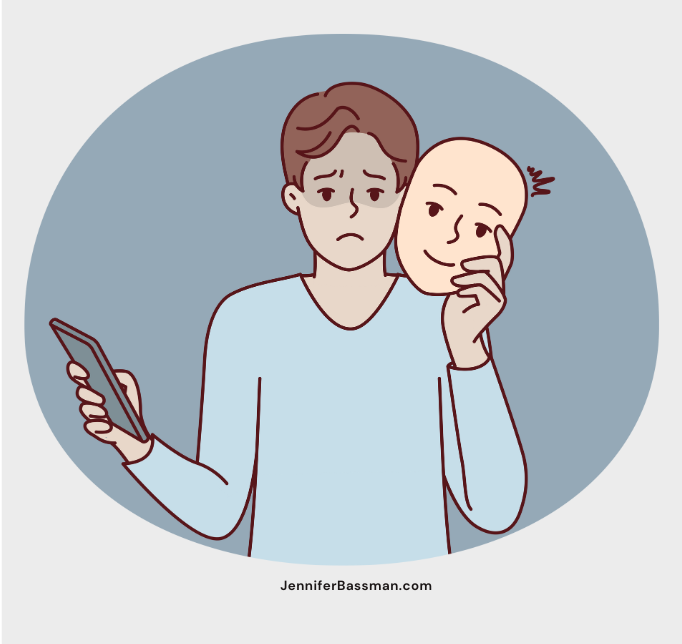Unhealthy coping mechanisms are part of what lead you and me to burnout.
Instead of creating a boundary, you downplayed how you felt about someone wasting your time.
Instead of apologizing for a mistake, you avoid the people who deserve an apology.
Or, instead of communicating an issue you have with someone on your tennis team, you just stop showing up.
What all of these situations have in common? They cause stress because you don’t solve the problem or deal with your emotions. You kick the can down the road to deal with in the future because it seems easier in the moment. But, leave yourself with stressful, emotional backlash in the present.
Join the conversation in my community! Join my email list to get effective burnout recovery information delivered right to your inbox.
Unhealthy coping mechanisms help us avoid, ignore, or run away from the source of distress.
Unhealthy coping mechanisms help us avoid, ignore, or run away from the source of distress. However, they only create more stress that continues to overwhelm our already over-stressed systems.
In my case, my unhealthy coping mechanism has been running into the arms of Ben & Jerry’s Cherry Garcia when I feel my stress response kicking in for a problem that doesn’t have an easy solution.
I recognize now, when I describe my experience with deep burnout, that it was largely the result of unhealthy coping mechanisms that were an unsuccessful attempt at managing my stress. Eventually, my unhealthy coping mechanisms stopped providing any sort of relief and when I began to understand how stressed-out I had become.
As I have described before – stress is sneaky. We don’t always feel it coming or realize how much of it we are tolerating because our bodies acclimate quickly to higher and higher levels of stress. It’s only when our coping mechanisms – unhealthy or healthy – that can keep us hanging on. It’s when they fail, we realize how stressed out we’ve become.
What I have always found interesting is the wide variety of coping mechanisms my burned-out clients and myself have chosen. Yet, I noticed there are five common unhealthy coping mechanisms we all seem to turn to in while in burnout as an attempt to manage our stress. (I’ll get to those in a minute.)
The coping mechanisms we choose depend a lot of factors, but largely follow the level of psychological distress we are experiencing at the time.
The Difference Between Healthy and Unhealthy Coping Mechanisms
Humans cope using thoughts and behaviors to manage any situation that is stressful or perceived as stressful. It’s a reactive response to a stressor. Some psychologists suggest that coping isn’t coping at all if a person resorts to using an unhealthy coping mechanism because they have failed to solve their stressful situation or problem.
Coping mechanisms are considered healthy when they involve tolerating, adapting to, and managing the effects of distress. You are proactively taking steps to address stressful emotions or experiences that protect your well-being. Examples could include reframing, positive self-talk, or deep breathing exercises.
Coping mechanisms are considered unhealthy when they allow you to ignore, run away from , or avoid the source of distress. You are thinking of or doing things that have negative physical, psychological, or emotional consequences. While the unhealthy coping mechanism can appear gratifying in the moment, it usually creates more problems. Examples could include procrastinating important work or decisions, or doom scrolling on social media.
How Unhealthy Coping Mechanisms Develop
In the moment, we don’t consider we are hiding from our problems when we lean on an unhealthy coping mechanism. We see it as a relief or a break. If avoiding your problems happens for a very brief period of time – like you put off doing a task until you are in the right frame of mind – that’s usually not unhealthy. It’s when you allow your feelings to linger, you don’t process them, or figure out a way to get past them.
When you are burned out, you tend to form destructive habits that are hard to undo. You procrastinate certain types of work, avoid people, and have a constant stream of negative self-talk running through your mind. It’s your perception that it’s better not to deal with things in a haste or you know you make terrible decisions when you are stressed out.
To relieve yourself of the guilt or the negative feelings caused by your lack of effort, your inability to decide, or your annoyance of others, you develop unhealthy coping mechanisms to relieve those guilty feelings. What you may not realize: your unhealthy coping mechanisms are causing you more stress at a time when you need to find ways to alleviate the stress you are already feeling.
5 Common Unhealthy Coping Mechanisms in Burnout
Those of you who are burned out – or even here to in an attempt to prevent it – may not notice some or any of these unhealthy coping mechanisms in yourself. That’s the scary part. It often takes someone else pointing out that we have stopped showing up to happy hour, have become overly critical of the people around you, or your only talk about your problems and difficulties.
This happens because we are hardwired for negativity and we seek it out more often than we are able to ignore it. But it is the people around us who notice – before we do – when our negative has entered unhealthy territory. Usually because it is affecting their relationship with you or your performance.
If those around you haven’t been brave enough to point out the possibility of an unhealthy coping mechanism, here are the five most common I see in my burned out clients and we begin to deal with them:
- Isolation: Also called withdrawal, is a common way for people to cope with their burnout. It’s considered unhealthy because it usually equates to avoiding the problem and overwhelming feelings. At first, it may seem to help, especially if you are using a distraction like binge watching TV or scrolling social media for hours.
But longer you isolate, the more it can begin affecting your mental health because humans are hardwired for social connection. Also, in the meantime, your problems are snowballing because you are avoiding them.
A healthier coping option: We all need some time alone to rest and relax – we need “Me Time.” I get that for some of us, “Me Time” is more therapeutic than being around others and/or forcing yourself to be around people when you aren’t in the mood is stressful. But, never spending time being social can lead to loneliness, a lower self-esteem over time. So, look for “low impact” ways to connect with others. Phone calls with friends, an exercise class, or walking where there are people around are all low-impact ways to connect without having to entirely invest.
- Overthinking: Thinking is a necessary process to understand, get clarity, and make decisions. Overthinking happens when you dwell or worry about the same thought repeatedly. This is usually in response to a fear of something. These worries and fears tend to paralyze you from taking action or making decisions.
Overthinking is a cornerstone behavior and coping mechanism of burnout. Most people in burnout are paralyzed by their anxiety and stress, overwhelmed with their problems, and struggle to make decisions or take action. You get caught in the “what if’s,” the “woulda, coulda, shoulda’s,” or the “I can’t” or “No one can…” mentality which is incapacitating.
Overthinking, when burned out, usually leads to making excuses.
A healthier coping option: The “I Will Method” begins with you listing all of the successes you’ve had in the past. Opening a business, growing your family, earning an award – all of that you can think of. The idea here is that you have done a lot of things well in the past, had some victories, and have been awarded for your great work.
Sometimes we get stuck in an overthinking loop because we are afraid we will fail or fail to live up to expectations. You get caught up in the “what ifs.” Write down those what if statements that are popping up in your mind, fueling your overthinking, and turn them into “I Will” statements.
“What if my ideas aren’t creative enough?” becomes “I will come up with creative ideas.”
“What if I give the wrong answer or make a bad decision?” becomes I will provide amazing answers and make great, solid decisions.
“What if this script flops?” becomes “I will write a script that helps people make a change.” - Toxic positivity: Many people think that just surrounding themselves with positive people or ideas will lead to a happy mindset. While it’s important to be around people with positive attitudes, there can be a point where the positivity becomes excessive and toxic.
Toxic positivity is telling yourself that everything will be alright no matter how difficult a situation is. Often our guts are telling us this is wrong and can sense the lie we are trying to make ourselves believe. Toxic positivity involves denying and minimizing real and valid negative emotions.
This type of coping prevents you from experiencing and processing genuine negative emotions such as anger, fear, and sadness. It’s an avoidance mechanism that hides your authentic human emotion that is necessary to feel in order to find lasting solutions to problems.
A healthier coping option: There is value in understanding and acknowledging the darker side of things. When bad things happen, we often get through them faster and find solutions when we face them head on. Instead of dismissing your feelings, create a safe space for yourself to experience your feelings and process something bad that has happened. Maybe it’s sitting in your car for a few minutes, sitting in an empty conference room, or closing the door to your bedroom for some alone time. Trying to process your negative feelings in front of others when you are burned out can feel like a weakness. So, take the audience out of it and spend some time on your own going through the stages of grief and acceptance.
- Catastrophizing: Catastrophizing means believing the worst will always happen and believing that you’re in a worse situation than you really are or exaggerating the difficulties you face.
People experiencing burnout typically become experts at this because their negative mindset doesn’t allow them to believe others are capable or trustworthy. The chronic stress has built up and doesn’t allow you to see the reality of the world around you. So, many things in your world become a threat.
You spend a lot of time thinking about and expecting things to fail or fail you.
A healthier coping option: Talk with a trusted friend or family member so they can help you challenge your thoughts and fears. More importantly, they can help you see the reality of your situation and solutions that your stress and fear doesn’t allow you to see or consider. Sometimes we can’t rely on our own interpretation of the world around us and need an objective set of eyes to help us see what is really going on.
- Downward social comparison: People who are burned out often have low self-esteem and will often seek out others they believe are somehow doing “worse” than them to make themselves feel better by contrast.
When I was deep into my burnout, I watched the show Cops quite a bit. Even though I had hit rock bottom when it came to managing my stress, I was watching people whose rock bottom earned them a spot airing it on national TV. Hey, at least I wasn’t so bad that I was getting arrested, right?
Eventually, downward social comparison backfires when you meet someone who is doing better than you, seems to have it all together. You are immediately reminded of what you perceive to be as your failings.
A healthier coping option: This one is tough because we can’t always detect our level of criticism towards others as being inappropriate. However, people around you can provide clues that your comments or thoughts may be inappropriate in the way they respond to you.
In these situations, take the time to build an awareness of why you were immediately critical of this other person. Jealousy? Different work styles? You feel they are better than you?
Then, challenge these critical thoughts. A great place to practice is sitting in traffic. Maybe someone cuts you off and your immediate response is to call them a name and declare them an incompetent driver. Instead, consider other options. Maybe they didn’t see you, were rushing to the hospital, or were avoiding an accident from someone cutting them off.
Instead of being concerned with another’s actions, focus on yours. “I’m glad I am paying attention to the road,” or “That was close, but I’m glad I have great reflexes!”






